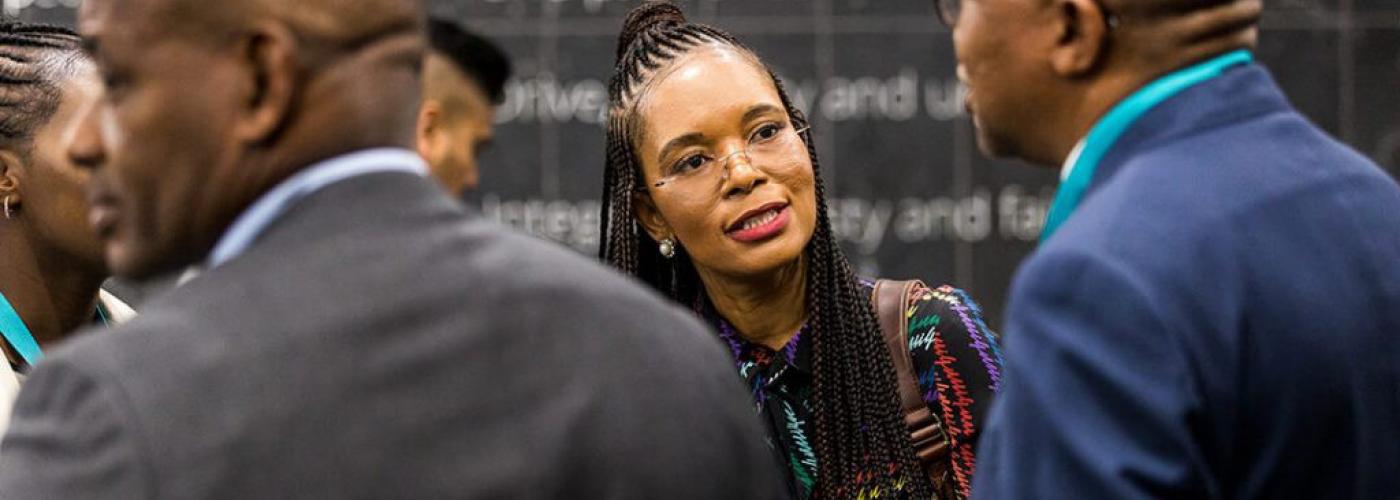Investing in Black Entrepreneurs: A South African Fund Leads the Way
Image

By Yasmine Williams, INVEST Senior Communications Advisor
South Africa is home to millions of small and medium-sized enterprises. These businesses create jobs and drive economic growth — they are vibrant, innovative, and undercapitalized.
Because of financing constraints, these SMEs often cannot access the capital they need to grow. Fortunately, the leaders of the SA SME Fund recognized the opportunity created by this rich universe of entrepreneurs, so they established a fund of funds to channel more capital into the country’s SMEs and help investors tap into the sector.
The Fund invests in a portfolio of other funds focused on South African SMEs, offering investors diversification, scale, lower volatility, and more stable investment returns, alongside development impact and local job creation.
The SA SME Fund invests more than half of its capital into Black African owned and managed businesses — boosting an inclusive investment ecosystem.
In this interview, Claudia Manning, Investment Principal with the SA SME Fund, shares her insights on the evolving investment landscape in South Africa and the opportunities emerging today.
This interview has been edited for clarity and length.
This post is made possible by the support of the American People through the United States Agency for International Development (USAID). The contents of this blog are the sole responsibility of INVEST implemented by DAI and do not necessarily reflect the view of USAID or the United States Government.
Why does the Fund have such a strong mandate to invest in Black African businesses?
Manning: We were very conscious that capital does not always find its way into the hands of fund managers and debt providers who are very good at what they do but not at the table where capital is being allocated. We set ourselves a target that half of the fund would be invested in Black African entrepreneurs. This made us very mindful and deliberate on how we were investing and who we were supporting. When you’re investing with a particular mandate, you don’t have the excuse of saying “Well, I can’t find women entrepreneurs or Black entrepreneurs we can support.”
What relationship do you see between venture capital and impact?
Manning: Investing in venture capital in an emerging market is almost always synonymous with investing in impact. Because if you’re in an advanced economy, consumers with large disposable incomes have got many options for what to do with their cash on hand. In emerging economies, where many people still live in low-income communities, entrepreneurs are very often solving the problems that they see around them. Access to quality education, access to affordable and quality healthcare, last-mile distribution for low-income consumers who live far away from where the shops are, logistical solutions that provide food to areas hit by floods or devastation — those are the kinds of businesses that our portfolio fund managers have invested in. And so, we really think that solving the capital problem for venture capital can have the unintended or intended consequence of actually deepening development impact in poor countries, by giving people of those countries better access to resources that help them to improve the quality of their lives.
Why has SA SME Fund taken a fund-of-funds approach rather than investing directly in startups?
Manning: We wanted to create a catalytic effect with a fairly small amount of capital — mobilizing funding for the early stage venture capital industry in South Africa. Although we have a very sophisticated capital market in South Africa, there’s still a gap in the VC space. If you starve a sector of capital, you’re not going to get the innovation that you want and you’re going to continue to have this gap going forward. We decided that the best way to close that gap is not by trying to do 100 deals ourselves but instead to back six or seven fund managers who each have their own portfolios of deals. We want to back fund managers and get them to do the actual investment in a way that changes the venture capital market substantially.
What are some of the challenges you’ve faced raising investment?
Manning: Funds of funds are typically fairly removed from their portfolio companies. This can be a problem for impact investors, who generally don’t like being that far removed from direct exposure to the deals. They’d rather be able to say that they have these specific companies within their portfolio rather than a set of funds. We’re working with USAID Southern Africa, through USAID INVEST, trying to identify U.S. investors who see the value in investing via a platform like a fund of funds and scaling hundreds of businesses across South Africa.
Another problem we’ve faced with non-South African investors is that we are a South Africa-focused fund. They often prefer to invest in regional funds or sub-Saharan Africa funds rather than one country fund, which they see as suboptimal.
Also, South African investors still see venture capital as very high risk. We’re working with the USAID to add a first-loss layer of capital into the fund, minimizing the risk for private investors. If the various funds perform well, everybody gets their required returns and are happy, but if the fund performs poorly, private investors benefit from the first-loss layer of capital and will be last in line to lose any money.
What are some of the opportunities you’ve seen in the wake of COVID-19?
Manning: Globally, it’s small businesses that have taken the brunt of the pain during COVID. If you’re a relatively small SME without a big balance sheet, you may have missed a payment on an overdraft in the last year — something not uncommon in an economy in a recession like we’ve had in South Africa. Even if you’re a viable business, this will disqualify you from accessing many of the COVID relief programs from the banks.
The non-banking financial industry — whether it’s providers of microloans or larger loans to established businesses — has an ability to structure debt to these small businesses in a way that manages risk. For example, merchant cash advances are a big feature of the South African retail industry. It works as follows: you look at the financial records of a restaurant or pub and see what the value of their credit card transactions were in the last few months. Let’s say it was worth about $100,000 last month. Now you know that’s the kind of cash flow that goes through the business and that about $100,000 is likely to happen in February and March. You’ll then advance $50,000 or $100,000, knowing that whatever happens to this business, you’ve got the ability to be able to service the debt at fixed, relatively affordable rates.
This business might have missed a bank payment and yet, they’re a good risk to take, because you know what kinds of cash flow you’re lending against. I think that that’s an important industry to be building, because those non-banking institutions will continue to support SMEs particularly in hard times. They will find innovative ways of deploying capital to help these businesses, and of course turn a profit. Many of these non-bank financial institutions have been doing this for many, many years and they’ve figured out how to assess risk and have the infrastructure to disburse quickly, without charging extortionist rates.
The health tech space will be another interesting one to watch. When I look at the companies in our fund managers’ portfolios, none of the heath tech companies were COVID-oriented when they started out. Now probably half of them have pivoted into providing resources or services that respond to the disease. For example, we’ve seen technology to help detect COVID or platforms that can create raw materials used in antigens or even vaccines. That’s a space we’re very excited about because it shows the ability of fairly young startups to pivot and develop tech that can respond to a global crisis.
This post is made possible by the support of the American People through the United States Agency for International Development (USAID). The contents of this blog are the sole responsibility of INVEST implemented by DAI and do not necessarily reflect the view of USAID or the United States Government.


